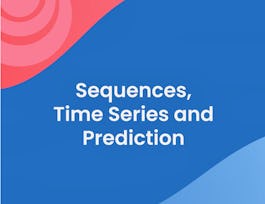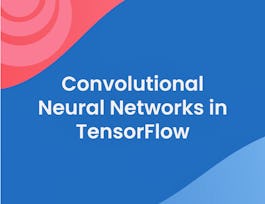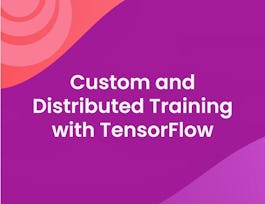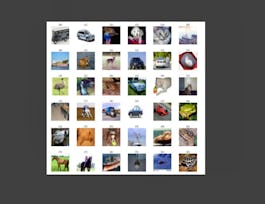If you are a software developer who wants to build scalable AI-powered algorithms, you need to understand how to use the tools to build them. This Specialization will teach you best practices for using TensorFlow, a popular open-source framework for machine learning.

Natural Language Processing in TensorFlow
This course is part of DeepLearning.AI TensorFlow Developer Professional Certificate
Taught in English
Some content may not be translated

Instructor: Laurence Moroney
137,824 already enrolled
Course
(6,402 reviews)
94%
Recommended experience
What you'll learn
Build natural language processing systems using TensorFlow
Process text, including tokenization and representing sentences as vectors
Apply RNNs, GRUs, and LSTMs in TensorFlow
Train LSTMs on existing text to create original poetry and more
Skills you'll gain
Details to know

Add to your LinkedIn profile
4 quizzes
Course
(6,402 reviews)
94%
Recommended experience
See how employees at top companies are mastering in-demand skills

Build your Machine Learning expertise
- Learn new concepts from industry experts
- Gain a foundational understanding of a subject or tool
- Develop job-relevant skills with hands-on projects
- Earn a shareable career certificate from DeepLearning.AI


Earn a career certificate
Add this credential to your LinkedIn profile, resume, or CV
Share it on social media and in your performance review

There are 4 modules in this course
The first step in understanding sentiment in text, and in particular when training a neural network to do so is the tokenization of that text. This is the process of converting the text into numeric values, with a number representing a word or a character. This week you'll learn about the Tokenizer and pad_sequences APIs in TensorFlow and how they can be used to prepare and encode text and sentences to get them ready for training neural networks!
What's included
13 videos9 readings1 quiz1 programming assignment
Last week you saw how to use the Tokenizer to prepare your text to be used by a neural network by converting words into numeric tokens, and sequencing sentences from these tokens. This week you'll learn about Embeddings, where these tokens are mapped as vectors in a high dimension space. With Embeddings and labelled examples, these vectors can then be tuned so that words with similar meaning will have a similar direction in the vector space. This will begin the process of training a neural network to understand sentiment in text -- and you'll begin by looking at movie reviews, training a neural network on texts that are labelled 'positive' or 'negative' and determining which words in a sentence drive those meanings.
What's included
13 videos8 readings1 quiz1 programming assignment
In the last couple of weeks you looked first at Tokenizing words to get numeric values from them, and then using Embeddings to group words of similar meaning depending on how they were labelled. This gave you a good, but rough, sentiment analysis -- words such as 'fun' and 'entertaining' might show up in a positive movie review, and 'boring' and 'dull' might show up in a negative one. But sentiment can also be determined by the sequence in which words appear. For example, you could have 'not fun', which of course is the opposite of 'fun'. This week you'll start digging into a variety of model formats that are used in training models to understand context in sequence!
What's included
10 videos8 readings1 quiz1 programming assignment
Taking everything that you've learned in training a neural network based on NLP, we thought it might be a bit of fun to turn the tables away from classification and use your knowledge for prediction. Given a body of words, you could conceivably predict the word most likely to follow a given word or phrase, and once you've done that, to do it again, and again. With that in mind, this week you'll build a poetry generator. It's trained with the lyrics from traditional Irish songs, and can be used to produce beautiful-sounding verse of it's own!
What's included
14 videos8 readings1 quiz1 programming assignment
Instructor

Offered by
Recommended if you're interested in Machine Learning

DeepLearning.AI

DeepLearning.AI

DeepLearning.AI

Coursera Project Network
Why people choose Coursera for their career




Learner reviews
Showing 3 of 6402
6,402 reviews
- 5 stars
72.65%
- 4 stars
19.06%
- 3 stars
5.65%
- 2 stars
1.57%
- 1 star
1.06%
New to Machine Learning? Start here.

Open new doors with Coursera Plus
Unlimited access to 7,000+ world-class courses, hands-on projects, and job-ready certificate programs - all included in your subscription
Advance your career with an online degree
Earn a degree from world-class universities - 100% online
Join over 3,400 global companies that choose Coursera for Business
Upskill your employees to excel in the digital economy
Frequently asked questions
Access to lectures and assignments depends on your type of enrollment. If you take a course in audit mode, you will be able to see most course materials for free. To access graded assignments and to earn a Certificate, you will need to purchase the Certificate experience, during or after your audit. If you don't see the audit option:
The course may not offer an audit option. You can try a Free Trial instead, or apply for Financial Aid.
The course may offer 'Full Course, No Certificate' instead. This option lets you see all course materials, submit required assessments, and get a final grade. This also means that you will not be able to purchase a Certificate experience.
When you enroll in the course, you get access to all of the courses in the Certificate, and you earn a certificate when you complete the work. Your electronic Certificate will be added to your Accomplishments page - from there, you can print your Certificate or add it to your LinkedIn profile. If you only want to read and view the course content, you can audit the course for free.
If you subscribed, you get a 7-day free trial during which you can cancel at no penalty. After that, we don’t give refunds, but you can cancel your subscription at any time. See our full refund policy.